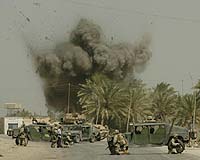| . |  |
. |
Washington (UPI) Jan 27, 2006 About 40,000 soldiers returning from Iraq and Afghanistan have been found to show symptoms of mental health disorders, a Department of Veterans Affairs (VA) representative said Friday. In fact, a mental condition known as Post Traumatic Stress Disorder (PTSD) - first recognized during the Vietnam era - is being diagnosed frequently among troops returning from the Middle East, and the VA has had to adjust its treatments and infrastructure to accommodate this, as well as the changing face of the American soldier. Although the fraction of soldiers diagnosed, about one-third, is higher than in the past, the VA has "no real way to know - in a true epidemiological sense - whether the rate is higher than past conflicts," Antoinette Zeiss of the VA office of mental health services, said at the National Press Club. The higher fraction could, in part, be due to increased screening, she said. As troops return home, they face the challenge of restarting their lives. Though most of the approximately 400,000 servicemen and women never seek help from the VA, those who do often must cope with the lingering effects of debilitating mental and physical injuries that differ from those in previous wars. Fortunately, new approaches to treatment are available as well. PTSD is the most common mental health problem among the troops returning home. The ailment, which results from exposure involving direct or indirect threat of serious injury or death, results in recurrent thoughts of trauma, reduced involvement in work or outside interests, hyper alertness, anxiety and irritability. Nearly 19,000 veterans of the conflicts in Afghanistan and Iraq were treated for post-traumatic stress between 2002 and 2005 in the administration's network of 160 specialized programs. The VA says it plans for 2006 a $29 million expansion of its post-traumatic stress services for veterans returning from Iraq and Afghanistan. In addition, 14,000 of the veterans diagnosed with PTSD were also treated for drug dependencies -- although the mix of drugs differs somewhat from the Vietnam era -- and 11,000 were treated for depression. Although all three of these most common problems were present in past wars, the administration has had to adapt its treatments to changing circumstances, Zeiss said. The veterans of these most recent wars are older, because the military has relied more heavily of National Guard and National Reserve units. About half of the troops are between 20 and 29, and another half are older than 30. Thirteen percent of the veterans receiving treatment are women, higher than in any past conflict. The role of women in the military has also changed. "We need to think not only about women veterans, which have always been a part of the VA," Zeiss said, "but also women warriors." The VA now operates seven outpatient women's stress disorder treatment teams to meet the special needs of female veterans. Treating veterans is also more complicated because of the more varied cultural and religious traditions of troops, Zeiss, who has spent many years treating veterans for mental problems, said. "It's important to remember how multi-cultural the United States - and its troops - are," Zeiss said. "The VA is trying to think in a cross-cultural way." Another more-frequent phenomenon is known as poly-trauma, when returning soldiers have both severe physical and mental wounds. Many soldiers with severe injuries, who would have died in past conflicts, are now surviving and require specialized care, Zeiss said. The VA has plans to expand the number of poly-trauma centers it operates from four to 21 to accommodate this increased need. For all veterans who suffer from mental disorders, methods of treatment are changing. The past practice of isolating them in hospitals has been replaced by an approach that stresses integrating patients into the community, and the support it can provide, as soon as possible. And recent studies have confirmed that new medications, such as SSRI drugs developed to treat depression, can be effective in treating Post-Traumatic Stress Disorder, an option not available in the past. A 2004 study, published in the New England Journal of Medicine, of nearly 6,000 Marines returning from Iraq and Afghanistan found that between 15 and 17 percent of Iraq conflict veterans and about 11 percent of veterans who served in Afghanistan suffered symptoms of mental disorders when they returned home. However, less than half of those affected sought care, in part because they feared they would be looked down on by their fellow soldiers and superior officers. The VA is reaching out to veterans to overcome attitudes and get them the help they need, Zeiss said.
Source: United Press International
Related Links  Washington (UPI) Jan 30, 2006
Washington (UPI) Jan 30, 2006The serious injury of new ABC network anchorman Bob Woodruff Sunday confirmed a grim trend we have been tracking for more than half a year in this column: The failure of U.S. coalition and allied Iraqi security forces to be able to come up with an effective counter-tactic to neutralize the effectiveness of improvised explosive devices (IEDs). |
|
| The content herein, unless otherwise known to be public domain, are Copyright 1995-2006 - SpaceDaily.AFP and UPI Wire Stories are copyright Agence France-Presse and United Press International. ESA PortalReports are copyright European Space Agency. All NASA sourced material is public domain. Additionalcopyrights may apply in whole or part to other bona fide parties. Advertising does not imply endorsement,agreement or approval of any opinions, statements or information provided by SpaceDaily on any Web page published or hosted by SpaceDaily. Privacy Statement |